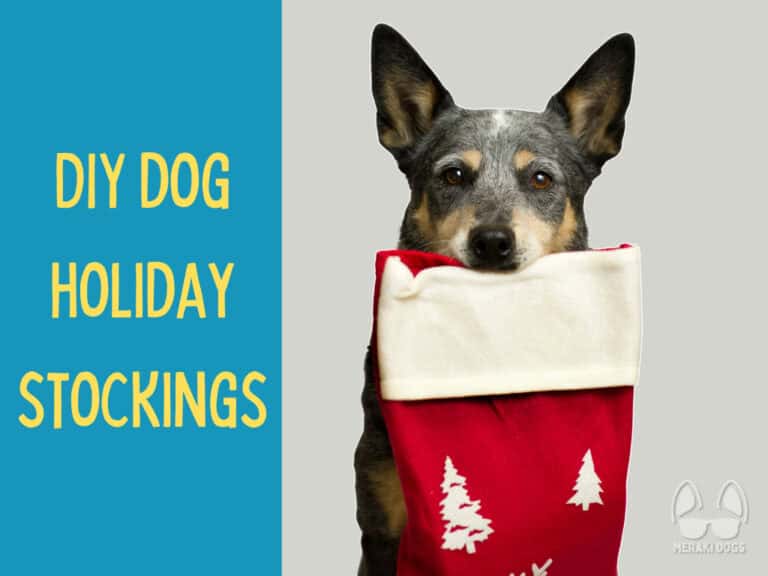Safe Holiday Lights for Dogs: LED vs. Traditional Lights in 2024

Meraki Dogs may earn a small commission when you buy through links on this site at no cost to you. See our disclaimer here.
Holiday lights bring a warm, festive glow to any home—but if you’re a dog owner, you know these decorations can also be a magnet for trouble. From chewed cords to shattered bulbs, holiday lighting can pose serious risks to your dog’s safety. Whether you’re considering LED or traditional lights, each type has unique benefits and potential dangers. This guide will help you make the best choice for safe holiday lights for dogs and cover essential safety tips along the way.
Key Takeaways
- LED lights are safer for dogs due to their cooler temperatures, shatterproof design, and lower voltage.
- Traditional lights can overheat, break easily, and pose higher risks of electrical shock.
- Regardless of your choice, dog-proofing your decorations is crucial to preventing accidents.
- Use cord protectors, secure lights out of reach, and supervise your dog around holiday décor.
The Dangers of Holiday Lights for Dogs
Holiday lights may look magical, but to your dog, they’re often chew toys or playthings waiting to happen. Unfortunately, this curiosity can lead to significant safety hazards.
Chewing Hazards
Dogs (especially puppies) are notorious for gnawing on things they shouldn’t—light cords included. This behavior can cause:
- Electrical shock.
- Burns from exposed wires.
- Digestive issues if swallowed.
Breakable Bulbs
Traditional holiday lights often use delicate glass bulbs, which are easily broken. This creates sharp shards that can:
- Cut your dog’s mouth or paws.
- Be accidentally ingested, leading to internal injuries.
Heat and Fire Risks
Incandescent lights, in particular, get hot after prolonged use. A curious touch or too much contact could result in burns or even spark a fire.

Advantages of LED Lights for Dog Safety
If you’re looking for a safer holiday lighting option, LED lights are the clear winner. Here’s why they’re better suited for homes with dogs:
Cooler to the Touch
LED lights emit minimal heat, even after hours of use. This eliminates the risk of burns if your dog gets too close.
Durable and Shatterproof
Unlike traditional glass bulbs, most LED lights are made with tough plastic, making them far less likely to break if bumped or chewed.
Energy Efficient and Safe for Extended Use
LED lights consume much less energy and are designed to stay cool, even when left on for long periods. This reduces the risk of overheating or fire.
Lower Voltage
LED lights typically operate at a lower voltage than traditional lights. So, even if your dog manages to chew through the cord, the risk of a severe electrical shock is significantly reduced.

Drawbacks of Traditional Holiday Lights
Sure, traditional lights have that old-fashioned charm, but when it comes to dog safety, they’re not ideal.
Hot Bulbs
Incandescent lights can reach high temperatures, making them a burn hazard for dogs and a fire risk if placed near flammable items, like a Christmas tree.
Fragile Bulbs
Traditional glass bulbs are notoriously fragile, creating sharp shards when broken. Combine that with a dog’s curiosity, and you have a recipe for injuries or ingestion risks.
High Voltage
Traditional lights operate at higher voltages, making them much more dangerous if chewed.
Energy Inefficiency
Not only do these lights consume more energy, but their inefficiency also makes them prone to overheating, increasing the chances of accidents.

Tips for Dog-Safe Holiday Lighting
Regardless of whether you choose LED or traditional lights, taking a few extra precautions can go a long way in keeping your dog safe this holiday season.
Use Cord Protectors
Cover exposed cords with protective tubing to discourage chewing. This is particularly important for young dogs or habitual chewers.
Secure Lights Out of Reach
Place lights higher up—along mantels, walls, or even at the top of your Christmas tree. For a completely pet-safe tree, check out ideas for a pet-safe Christmas tree.
Opt for Battery-Operated Lights
Battery-powered LED lights eliminate the need for cords, reducing the risks of chewing or tangling.
Avoid Tinsel and Small Decorations
Tinsel might look pretty, but it’s a choking hazard for dogs. Instead, opt for non-toxic holiday garlands or other pet-friendly décor.

Additional Safety Considerations for Holiday Lighting
Your choice of lighting is just one part of creating a dog-safe holiday home. Here are more ways to protect your pup:
Unplug Lights When Unattended
When you’re not around to supervise, unplug your holiday lights. This reduces the chance of accidents, overheating, or fires.
Inspect Lights Before Use
Always check for frayed wires, loose bulbs, or other damage before plugging in your lights.
Use a Timer
Set your lights on a timer to control when they’re on or off. This minimizes risks and saves energy.
Supervise Your Dog
Even with the safest setup, curious dogs may still find trouble. Keep an eye on your pup around decorations and gently redirect them if they get too interested.
Conclusion: Safe Holiday Lights for Dogs
When it comes to holiday lighting, safe holiday lights for dogs should be your top priority. LED lights stand out as the safer, more practical choice due to their durability, low heat output, and energy efficiency. While traditional lights may hold nostalgic appeal, their higher risks—like breakage and overheating—make them less suitable for pet-friendly homes.
To ensure a safe and festive holiday season, choose LED lights, use cord protectors, and secure decorations out of reach. With a few simple precautions, you can keep your dog safe and your home glowing with holiday cheer.
Want more tips for dog-safe holiday decorations? Sign up for our newsletter and make your holidays stress-free and pet-friendly!






